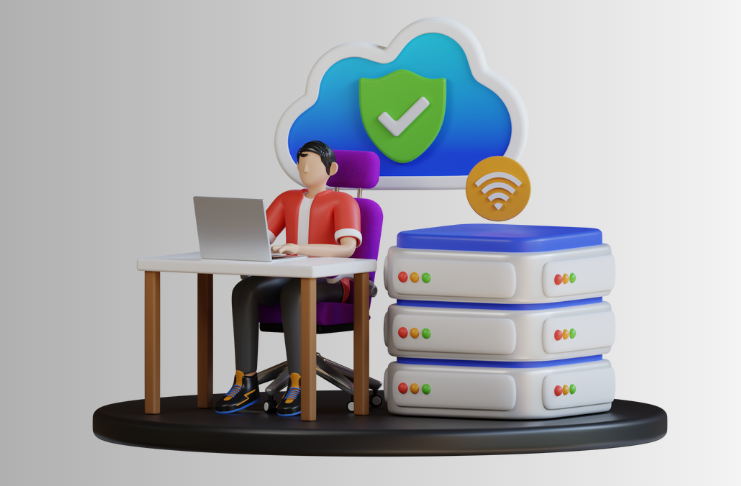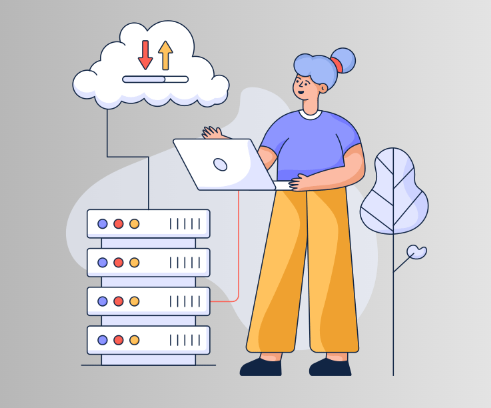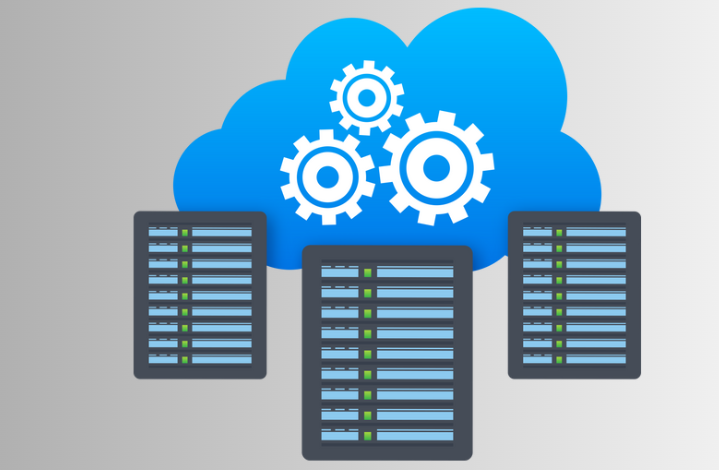Cloud servers are similar to physical servers used in storage and distribute various resources across the internet. However, there is only one major difference which makes cloud servers a favourite choice for businesses having digital presence.
Cloud servers are virtual servers which allow users to access its wide range of resources remotely over a network. Cloud servers provide similar resources and functions. Cloud servers are more accessible than traditional physical servers which run in a local data centre.
What are Cloud Servers?
A Cloud server is a virtual server that operates on a cloud computing platform which can be created, configured and managed with software tools rather than any need for the hardware tools or components.

It provides various resources over the internet which can be accessed remotely from anywhere. It provides resources such as databases, files, web servers, software as a service (SaaS), and more. Cloud servers are getting popular because of their adaptability, scalability and cost effectiveness.
Cloud Servers Key Takeaways
- Cloud servers are alternatives to on-premises data centre servers with higher performance and large storage solutions.
- Cloud servers provide higher accessibility and automated services on demand through API
- It works on a pay as you go based model where you only need to pay for the services you avail during a period.
- You can enrol in a shared hosting plan subscription and scale it as per your needs.
- Cloud servers provide a range of cloud services on cloud computing platforms.
Why are Cloud Servers Prominent and Effective?
Cloud servers are virtual servers which provide data storage and other services via the internet. They do not require physical components and can be set up on software tools and frameworks. The ease of setup, scalability and accessibility if offered to the users makes it an undisputed choice for businesses nowadays.

Based on pay as you go subscription models cloud servers are cost effective alternatives for businesses as they also mitigate hardware management costs of costly hardwares. They offer high scalability as they can easily be scaled as per your changing needs. Cloud servers can easily be integrated with a large number of resources, applications and services to offer uninterrupted communication and faster deployment.
What is the Difference between a Cloud Server and a Traditional Server?
Cloud servers and traditional on premise servers offer a wide range of similarities as they deliver high processing power, storage and resources. The major difference is that cloud servers can be remotely accessed from anywhere and offer more scalability and security than a traditional server.
Cloud servers can easily be shared among various users and can easily be scaled as per the business needs. However, in traditional servers you might need to purchase new hardware components to scale uses. A traditional server is confined to a single organisation and can only be accessed by users of the organisation.
While cloud servers are distributed over an internet network with unlimited computing capacity irrespective of traditional storage servers which offer limited compute capacity.
Also, check, What are the benefits of Cloud Hosting?
Working of Cloud Servers
Cloud servers work like traditional servers but are hosted on a virtual cloud computing platform which can be accessed via the internet. Cloud servers are made from the compute resources of the physical servers. Cloud servers create multiple virtual machines on a physical server where each VMs has its own operating system, applications, and data.

They are created on a cloud computing platform based on the Infrastructure as a Service (IaaS) model where users can rent resources on a planned subscription and shared pool services to work and collaborate simultaneously. Resources are allocated to users based on their requirements and subscription plans.
Data is stored on data centres and can be accessed from anywhere over the internet. Multiple copies of data are stored in different locations for enhanced security, reliability and better disaster management alternatives.
Types of Cloud Servers
There are three important types of cloud servers which offer customised accessibility, scalability and resources over the internet. Check all differences below.
| Public Cloud Servers | Private Cloud Servers | Dedicated Cloud Servers |
| A cloud infrastructure shared among multiple users and organizations. | A cloud infrastructure used exclusively by a single organization. | A physical server exclusively allocated to a single customer, hosted by a cloud provider. |
| Owned and managed by cloud service providers (e.g., AWS, Azure, Google Cloud). | Can be owned by the organization or hosted by a third-party provider. | Owned and managed by a cloud provider but fully dedicated to one client. |
| Cost-effective due to shared resources (pay-per-use model). | More expensive due to exclusive infrastructure but more control. | Higher cost because of dedicated resources. |
| Highly scalable (virtually unlimited on-demand resources). | Scalable but limited by the infrastructure size. | Scalable but with more limitations compared to the public cloud. |
| Standard security measures (shared environment increases risk of data breaches). | High security, as resources are not shared with other organizations. | High security with dedicated resources, similar to private cloud. |
| Limited customization due to shared nature. | Full control over infrastructure and high customization. | Full control over the server’s configuration and performance. |
| Suitable for small to medium businesses with low security concerns and budget constraints. | Ideal for enterprises with strict regulatory and security requirements. | Best for companies needing high performance, control, and security without managing physical hardware. |
| Managed entirely by the cloud provider (maintenance, updates). | Maintenance can be managed by the company or outsourced to the cloud provider. | Fully managed by the cloud provider, though the user manages the software stack. |
| Performance can vary depending on the number of users sharing the infrastructure. | Performance is more predictable and consistent due to dedicated resources. | High performance due to dedicated hardware and no resource sharing. |
Also, check, Best Cloud Certifications in 2024
Benefits of Cloud Servers
Choosing cloud servers delivers higher performance and a wide range of benefits.
- Easy to use: Cloud servers can easily be integrated with multiple platforms and can easily be accessed via the internet.
- Accessibility: Cloud servers allow users to access their data and resources from anywhere around the globe.
- Cost effective: Cloud servers work on pay as you go model subscription which allow users to pay only for the resources used by them over a period of time.
- Low maintenance: Based on software tools and frameworks cloud servers need very low maintenance and can be auto updated to fix performance issues over time.
- Automation: Cloud servers offer a wide range of automation where repetitive tasks are managed by cloud servers itself.
Challenges of Cloud Servers
Cloud servers are getting more and more attention however there are many challenges it still needs to rectify to reduce shortcomings for any organisations.
- Performance lags: Sometimes due to various reasons cloud resources often incur latency and disruptions which reduce the performance and create bad user experience. VMs might suffer due to excessive loads over specific regions where network demand is over too much.
- Outage and resilience: Cloud servers might sometimes incur unexpected service outage due to faults in internet network distribution or on the cloud provider side.
- Cost Management: If not monitored regularly the unplanned usage can lead to high bills.
- Compliance and Regulatory Challenges: There are various laws and security policies that restricts cloud servers in many jurisdictions which can complicate and disturb the usages of cloud servers globally.
- Limited Control: Users have limited control over the infrastructure of servers and any software customisation can be more complex on cloud servers.
Learn DevOps and Cloud Computing with PW Skills
Enrol in our 6 month DevOps and Cloud Computing Course and master the art of deploying, running and maintaining a cloud based server and the art of using DevOps management system between operational and development teams. Master advanced DevOps tools like Docker, Kuberenetes, Ansible, Terraform, Jenkins to make yourself job ready.
Get access to industry mentorship sessions, interview opportunities, industry based curriculum, certification, and much more only at pwskills.com
Cloud Servers FAQs
Q1. What are cloud servers?
Ans: Cloud servers are alternatives to on-premises data centre servers with higher performance and large storage solutions. It provide higher accessibility and automated services on demand through API.
Q2. What are the types of cloud servers?
Ans: The three important types of cloud servers are public, private and hybrid. These types of cloud servers offer a wide range of resources, accessibility solutions, scalability and other features.
Q3. Why is it called a cloud server?
Ans: A cloud server is named so as it runs on a cloud computing platform and can be accessed remotely from anywhere with network connectivity. They are hosted by cloud service providers who manage, store, process data applications over the cloud.
Q4. Which cloud server is best?
Ans: AWS and Google Cloud Platform, Microsoft Azure are some of the most popular examples of cloud servers.

